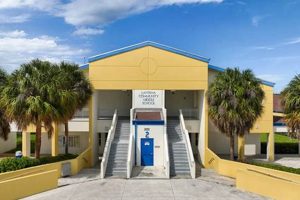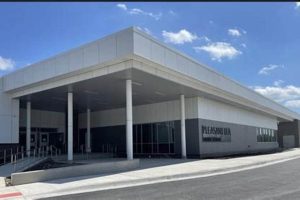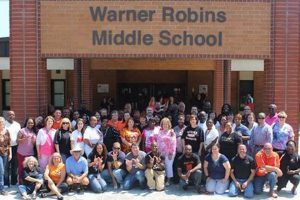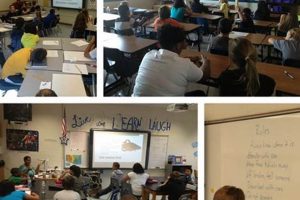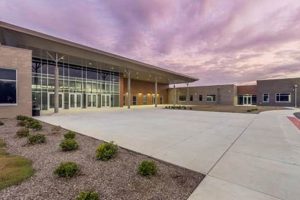Future Business Leaders of America – Phi Beta Lambda (FBLA-PBL) offers a program specifically designed for middle school students. This program provides opportunities for students to develop leadership skills, explore business and career interests, and participate in competitive events focused on areas such as public speaking, business communications, and financial literacy. For example, students might compete in events involving creating a business plan or delivering a presentation on a current economic topic.
Participation in such a program can be a valuable experience for young people. It provides early exposure to fundamental business concepts, fosters teamwork and collaboration skills, and encourages personal and professional growth. Historically, FBLA-PBL has served as a pipeline for future business leaders, providing members with the skills and knowledge necessary to succeed in the professional world. This middle school level program extends that opportunity to a younger demographic, cultivating essential skills earlier in their academic careers.
This article will further explore specific aspects of the organization’s middle school program, including details on membership, competitive events, curriculum resources, and the potential benefits of involvement for both students and educators.
Tips for Success in FBLA Middle School
Maximizing the benefits of participation requires proactive engagement and a strategic approach. The following tips offer guidance for students seeking to excel within the program.
Tip 1: Active Participation: Consistent attendance at chapter meetings and active involvement in activities are crucial. Regular participation allows students to fully grasp the concepts presented and network with peers and mentors.
Tip 2: Early Event Preparation: Competitive events require dedicated preparation. Beginning early allows ample time for research, practice, and refinement of skills. This includes familiarizing oneself with the event guidelines and seeking guidance from advisors or past participants.
Tip 3: Skill Development: Focus on developing core business skills, including communication, public speaking, and financial literacy. These skills are valuable not only for competitive events but also for future academic and professional pursuits.
Tip 4: Teamwork and Collaboration: Many FBLA activities and competitive events emphasize teamwork. Embrace collaborative opportunities to develop interpersonal skills and learn from peers.
Tip 5: Networking: FBLA provides opportunities to connect with business professionals and mentors. Engage in networking activities to gain insights into various career paths and build valuable relationships.
Tip 6: Explore Resources: Take advantage of the resources offered by the organization, including online study materials, practice tests, and workshops. These resources can significantly enhance knowledge and preparedness for competitive events.
Tip 7: Seek Mentorship: Connect with chapter advisors, teachers, or older FBLA members for guidance and support. Mentorship can provide valuable insights and personalized advice for achieving success.
By implementing these strategies, students can effectively leverage the opportunities provided by the program, enhancing their learning experience and achieving their full potential. These acquired skills and knowledge will serve as a strong foundation for future academic and professional endeavors.
In conclusion, these tips provide a roadmap for successful navigation and engagement within the organization, ultimately leading to greater personal and professional growth.
1. Leadership Development
Leadership development forms a cornerstone of the FBLA middle school experience. The program cultivates leadership qualities through various activities and opportunities, preparing students for future roles in business, academics, and their communities. This focus on leadership distinguishes the program and provides students with a competitive edge.
- Communication Skills
Effective communication is fundamental to leadership. FBLA provides opportunities for students to hone both written and oral communication skills through presentations, competitive events, and chapter meetings. For instance, participating in public speaking competitions allows students to practice articulating ideas clearly and persuasively. This skill is crucial for leading teams, presenting proposals, and navigating professional environments.
- Decision-Making and Problem-Solving
Leaders must make informed decisions and solve complex problems. FBLA engages students in activities that require critical thinking and strategic planning, such as developing business plans or analyzing case studies. Through these exercises, students learn to evaluate options, assess risks, and implement effective solutions. This analytical approach translates to improved decision-making skills applicable in various academic and professional contexts.
- Teamwork and Collaboration
Leadership often involves guiding and motivating teams. FBLA emphasizes teamwork through group projects, collaborative activities, and competitive events that require collective effort. Working within a team environment teaches students how to delegate tasks, manage conflicts, and leverage individual strengths to achieve shared goals. These collaborative skills are essential for effective leadership in any setting.
- Professionalism and Ethics
Ethical conduct and professional demeanor are hallmarks of effective leadership. FBLA promotes ethical behavior and professional standards through its code of conduct and emphasis on integrity in all activities. Students learn the importance of maintaining professionalism in their interactions, upholding ethical principles in decision-making, and representing themselves and their organization with integrity. This focus on ethics instills values that are essential for responsible leadership.
These interconnected facets of leadership development within the FBLA middle school program equip students with a comprehensive skillset applicable far beyond the classroom. By fostering these qualities early in their academic careers, FBLA empowers students to become effective and ethical leaders in their future endeavors.
2. Business Skills
Developing fundamental business skills is central to the FBLA middle school experience. The program provides students with practical exposure to core business principles, preparing them for future academic and professional success. Understanding these skills and their applications is crucial for maximizing the benefits of FBLA membership.
- Financial Literacy
Managing finances effectively is a critical life skill. FBLA introduces students to fundamental financial concepts, including budgeting, saving, investing, and understanding financial statements. Through workshops, simulations, and competitive events, students gain practical experience in applying these concepts. This early exposure to financial literacy empowers students to make informed financial decisions and prepares them for future financial responsibilities.
- Marketing and Sales
Understanding how to market and sell products or services is essential in the business world. FBLA exposes students to marketing principles, including market research, advertising, and sales strategies. Participating in events such as sales presentations or developing marketing campaigns allows students to develop persuasive communication skills and understand consumer behavior. This knowledge is valuable for future entrepreneurial endeavors or careers in marketing and sales.
- Entrepreneurship
Cultivating an entrepreneurial mindset encourages innovation and problem-solving. FBLA provides opportunities for students to explore entrepreneurial concepts through business plan development competitions and simulations. These activities teach students how to identify opportunities, develop innovative ideas, and create viable business models. This fosters a spirit of innovation and equips students with the skills to pursue their own entrepreneurial ventures.
- Project Management
Effectively managing projects is essential for success in any field. FBLA engages students in project-based activities, teaching them how to plan, organize, execute, and evaluate projects. This includes setting goals, managing timelines, and allocating resources effectively. Developing these project management skills early on prepares students for future academic and professional projects, enhancing their organizational and leadership capabilities.
These interconnected business skills form a strong foundation for future academic and professional pursuits. By integrating these skills through practical application and real-world examples, FBLA provides middle school students with a competitive edge and prepares them for success in a rapidly evolving business landscape.
3. Career Exploration
Career exploration is a significant component of FBLA middle school, providing students with early exposure to various career paths within the business world. This exposure is crucial for informed decision-making regarding future academic and professional pursuits. By connecting classroom learning to real-world applications, FBLA helps students understand the relevance of their education and how it can translate into specific career opportunities. For instance, a student interested in marketing might participate in a market research project, gaining practical experience and insight into the daily activities of a marketing professional. Similarly, involvement in a mock business competition could expose students to the challenges and rewards of entrepreneurship.
This early career exploration can have a profound impact on students’ academic trajectories. By identifying areas of interest early on, students can tailor their course selections in high school and beyond to align with their career aspirations. For example, a student who discovers a passion for finance through FBLA might choose to focus on mathematics and economics courses, laying the groundwork for a future in finance. Furthermore, exposure to various career paths can broaden students’ perspectives and encourage them to consider options they may not have previously known. This can lead to a more fulfilling and purposeful career path.
Exposure to diverse career options within the business realm is not merely about identifying a specific job title; it’s about cultivating an understanding of the skills and knowledge required for success in various fields. FBLA facilitates this understanding through workshops, networking events, and interactions with business professionals. These experiences provide valuable insights into the practical application of business concepts and the day-to-day realities of different professions. Ultimately, FBLA’s emphasis on career exploration empowers students to make informed decisions about their future, setting them on a path towards a successful and rewarding career.
4. Competitive Events
Competitive events are integral to the FBLA middle school experience, providing students with opportunities to apply classroom knowledge, develop essential skills, and gain recognition for their achievements. These events serve as a practical testing ground for business acumen, fostering a competitive spirit while promoting teamwork and collaboration. Participation in these events significantly enhances the overall learning experience, bridging the gap between theory and practice.
- Objective Evaluation
Competitive events offer an objective evaluation of students’ skills and knowledge. Judges, often business professionals, assess performance based on predetermined criteria, providing valuable feedback for improvement. This objective assessment helps students identify strengths and weaknesses, fostering continuous learning and development. For instance, in a presentation event, judges might evaluate clarity of communication, organization of content, and effective use of visual aids, offering specific feedback on each aspect.
- Skill Enhancement
Preparation for competitive events cultivates essential skills such as public speaking, problem-solving, and critical thinking. Students research topics, analyze case studies, and develop presentations, honing these skills in a practical context. For example, a business plan competition requires students to research market trends, develop financial projections, and articulate a compelling business strategy, thereby enhancing analytical and communication skills.
- Real-World Application
Many competitive events simulate real-world business scenarios, providing students with valuable experience in applying business principles to practical situations. This practical application reinforces classroom learning and provides a deeper understanding of business concepts. For instance, a marketing competition might challenge students to develop a marketing campaign for a real product, exposing them to the complexities and considerations involved in real-world marketing strategies.
- Recognition and Advancement
Success in competitive events brings recognition and opportunities for advancement. Top performers at the regional and state levels can qualify for national competitions, gaining broader exposure and recognition for their achievements. This recognition can boost confidence, enhance resumes, and open doors to future opportunities. Moreover, the pursuit of excellence in these competitions instills a drive for achievement and a commitment to continuous improvement.
Competitive events, therefore, play a crucial role in the FBLA middle school program, offering a dynamic and engaging platform for students to develop essential skills, apply business concepts, and gain valuable experience. These events are not merely competitions; they are opportunities for growth, learning, and recognition, shaping future business leaders and preparing them for success in the professional world.
5. Networking Opportunities
Networking opportunities within FBLA middle school provide students with invaluable connections and insights into the professional world. These connections can significantly influence future career paths, providing guidance, mentorship, and a broader understanding of various industries. Building a professional network at a young age offers a distinct advantage, fostering long-term career prospects and personal growth.
- Mentorship from Professionals
FBLA often facilitates interactions with established business professionals, offering mentorship opportunities for middle school students. These mentors can provide guidance on career choices, share industry insights, and offer advice on developing essential skills. For example, a student interested in accounting could connect with a certified public accountant (CPA) for advice on educational pathways and career prospects. This personalized mentorship can be instrumental in shaping a student’s future career trajectory.
- Connections with Business Leaders
FBLA events and conferences frequently feature presentations and workshops led by prominent business leaders. These events offer opportunities to learn from successful individuals, gain exposure to different leadership styles, and understand the challenges and rewards of leadership roles. Hearing firsthand accounts of entrepreneurial journeys or corporate leadership experiences can inspire students and broaden their understanding of the business world.
- Peer-to-Peer Networking
FBLA fosters a collaborative environment where students can connect with peers who share similar interests and career aspirations. This peer-to-peer networking can create valuable support systems, facilitate the exchange of ideas, and foster a sense of community among aspiring business leaders. Collaborating on projects, sharing study strategies, and discussing career goals can create lasting connections and mutual support throughout their academic and professional journeys.
- Exposure to Diverse Industries
Through FBLA activities and events, students gain exposure to a variety of industries and career paths. This exposure expands their understanding of the business landscape and allows them to explore different career options. Site visits to local businesses, presentations by professionals from diverse fields, and participation in industry-specific competitions can provide valuable insights into various career possibilities, helping students make more informed decisions about their future.
These networking opportunities within FBLA middle school provide students with a significant advantage as they embark on their academic and professional journeys. The connections forged, the insights gained, and the mentorship received can shape career aspirations, provide valuable guidance, and ultimately contribute to long-term success in the business world. These early networking experiences lay the foundation for a robust professional network that can support and inspire students throughout their careers.
6. Academic Preparation
Academic preparation forms a crucial link between FBLA middle school and future academic success. Participation in FBLA complements and enhances classroom learning, providing practical application of academic concepts and fostering essential skills for higher education. This connection between FBLA and academic preparedness equips students with the knowledge and skills necessary to excel in their academic pursuits, laying a solid foundation for future success.
- Enhanced Business Curriculum
FBLA activities often align with and reinforce concepts taught in business and related courses. For instance, participation in a marketing competition complements classroom learning in marketing principles, providing practical experience and a deeper understanding of marketing strategies. This practical application solidifies theoretical knowledge and enhances comprehension of core business concepts. Furthermore, FBLA can introduce students to specialized business areas, sparking interest and motivating further exploration in specific fields.
- Improved Communication and Presentation Skills
FBLA emphasizes effective communication and presentation skills, which are critical for academic success. Participating in presentations, debates, and public speaking competitions cultivates these skills, equipping students with the confidence and ability to articulate ideas clearly and persuasively. These enhanced communication skills benefit students in various academic settings, from classroom discussions to presentations of research projects. This ability to communicate effectively is essential for academic achievement and future career success.
- Strengthened Research and Analytical Skills
Many FBLA competitive events require research, data analysis, and problem-solving. Preparing for these events hones analytical skills, encouraging critical thinking and the ability to interpret and apply information effectively. For example, a business case study competition requires students to analyze complex business situations, develop solutions, and present their findings, strengthening research and analytical abilities crucial for academic success in various disciplines. These skills are transferable to diverse academic fields and promote a rigorous approach to problem-solving.
- Increased College and Career Readiness
FBLA involvement signals a commitment to academic and professional development, enhancing college applications and demonstrating a proactive approach to career preparation. Participation in FBLA activities, leadership roles, and competitive event achievements showcase valuable skills and experiences that colleges and universities value. Furthermore, the skills and knowledge gained through FBLA prepare students for the rigors of higher education and the demands of the professional world, increasing their readiness for future success.
These facets of academic preparation, nurtured through FBLA middle school, collectively contribute to a well-rounded educational experience, preparing students not only for academic success but also for the challenges and opportunities of future careers. The skills and knowledge acquired through FBLA provide a strong foundation for lifelong learning and professional growth, empowering students to achieve their full potential.
7. Community Involvement
Community involvement represents a vital aspect of FBLA middle school, extending the learning experience beyond the classroom and fostering a sense of civic responsibility. Engaging with the community provides students with practical application of leadership skills, business acumen, and a deeper understanding of societal needs. This connection between FBLA and community engagement enriches the educational experience and cultivates well-rounded individuals prepared to contribute positively to society.
- Service Projects and Volunteerism
FBLA frequently encourages participation in community service projects, providing opportunities for students to apply their skills and knowledge to address local needs. Volunteering at a local food bank, organizing a fundraising drive for a charitable organization, or participating in a community cleanup initiative provides practical experience in project management, teamwork, and community engagement. These experiences instill a sense of civic responsibility and demonstrate the positive impact of applying business skills to serve the community. For example, students might use their marketing skills to promote a fundraising event, leveraging their FBLA-developed skills to benefit a local cause.
- Partnerships with Local Businesses
FBLA chapters often collaborate with local businesses, creating mutually beneficial partnerships that enhance the learning experience and connect students with the professional community. Students might assist with marketing campaigns, conduct market research, or participate in job shadowing programs, gaining valuable insights into the operations of local businesses. These partnerships provide real-world experience and expose students to various career paths within their community. For instance, collaborating with a local retail store could provide students with insights into inventory management, customer service, and sales strategies.
- Community Awareness Campaigns
FBLA members frequently engage in community awareness campaigns, addressing important social and economic issues. Developing and implementing campaigns on topics such as financial literacy, environmental sustainability, or promoting local businesses provides opportunities to apply communication and marketing skills while contributing to positive change within the community. These campaigns raise awareness, educate the public, and demonstrate FBLA’s commitment to community betterment. For example, students could develop a social media campaign promoting financial literacy resources available in the community, leveraging their digital skills to address a critical societal need.
- Fundraising and Resource Development
FBLA chapters frequently engage in fundraising activities to support community organizations or to fund chapter initiatives. Organizing fundraising events, developing grant proposals, or securing sponsorships provides practical experience in financial management, marketing, and community outreach. These activities teach students the importance of resource development and demonstrate the impact of collective effort in supporting community initiatives. For instance, students might organize a charity auction, applying their business skills to raise funds for a local charity or to support FBLA chapter activities.
These facets of community involvement, fostered through FBLA middle school, create a powerful synergy between education and civic engagement. By actively participating in their communities, students develop valuable skills, gain practical experience, and cultivate a sense of responsibility towards society. These experiences not only enrich their FBLA experience but also shape them into well-rounded individuals prepared to make meaningful contributions to their communities and the world beyond.
Frequently Asked Questions
This section addresses common inquiries regarding FBLA middle school, providing clarity and dispelling potential misconceptions about the program.
Question 1: What are the membership requirements for FBLA middle school?
Typically, enrollment in a recognized middle school program and payment of membership dues are required. Specific eligibility criteria may vary depending on the local chapter and state regulations. Contacting a local chapter advisor or consulting the national FBLA-PBL website provides definitive information.
Question 2: How much time commitment is involved in FBLA middle school?
The time commitment varies depending on the level of involvement. Regular chapter meetings, competitive event preparation, and participation in community service projects constitute the primary time commitments. Active members often dedicate more time, especially during competitive event seasons. Balancing FBLA activities with other academic and extracurricular commitments is essential.
Question 3: How does FBLA middle school benefit students academically?
FBLA complements classroom learning by providing practical application of business concepts and fostering essential skills such as communication, critical thinking, and problem-solving. These skills translate to improved academic performance and enhanced college and career readiness.
Question 4: What types of competitive events are offered at the middle school level?
Competitive events cover a range of business-related topics, including public speaking, business communications, financial literacy, and career exploration. Specific event offerings can vary by state and region. The official FBLA-PBL website provides a comprehensive list of competitive events and their respective guidelines.
Question 5: How can parents support their children’s involvement in FBLA middle school?
Parental support plays a significant role in a student’s success within FBLA. Encouraging participation, facilitating transportation to meetings and events, assisting with fundraising efforts, and providing a supportive environment for competitive event preparation contribute significantly to a positive FBLA experience.
Question 6: What are the long-term benefits of participating in FBLA middle school?
Developing essential business skills, building a professional network, gaining exposure to various career paths, and enhancing college and career readiness are among the long-term benefits. FBLA experiences can shape future academic and professional pursuits, providing a foundation for lifelong success.
Understanding these key aspects of FBLA middle school empowers students, parents, and educators to make informed decisions regarding participation. The program offers significant benefits for students seeking to develop essential skills, explore business-related careers, and build a strong foundation for future success.
For further information and details, please consult the official FBLA-PBL website.
Conclusion
FBLA middle school programs offer significant advantages for students embarking on their academic and professional journeys. Exploration of this organization reveals comprehensive leadership development opportunities, practical business skill acquisition, early career exploration benefits, and the value of competitive event participation. Furthermore, the networking opportunities and emphasis on community involvement enrich the overall experience, fostering well-rounded individuals prepared to contribute meaningfully to society. Academic preparation facilitated through FBLA participation equips students with the tools necessary for success in higher education and beyond.
The potential impact of FBLA middle school participation extends far beyond the immediate classroom. The skills acquired, the connections forged, and the experiences gained can shape future career paths, foster lifelong learning, and empower individuals to become effective leaders within their communities and the professional world. Cultivating these qualities in young people holds significant promise for the future of business and leadership. Continued support and engagement with such programs are essential for fostering the next generation of business leaders and innovators.


